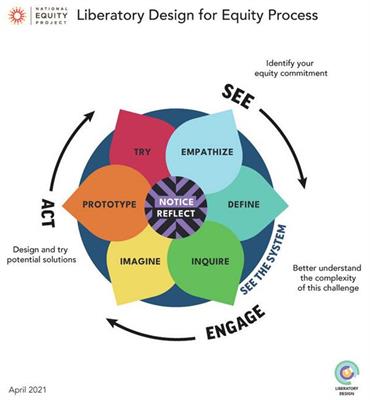One of the three pillars of the 2030 strategic plan is Student Success and Opportunity.
Goal 1 of this Pillar for Bloomington’s campus focuses on Undergraduate Academic Experience and Career Preparation, with one of the objectives calling for us to consider evidence-based pedagogy, with the goal of enhancing evidence-based pedagogy and inclusive teaching practices to improve student outcomes in academic courses.
The article: Humanizing STEM education: an exploratory study of faculty approaches to course redesign explores the challenges faced by STEM faculty in promoting inclusive practices and equity in higher education. The research analyzes reflections from 26 STEM faculty members across various US institutions who participated in the online course “The Humanity of Inclusive Practices” offered by the John N. Gardner Institute as part of a Teaching Learning Academy (TLA) focused on undergraduate education.
Participants answered three questions at the end of the online course:
- What are your equity challenges?
- What are your goals?
- How do you measure your success?
Two main themes emerged in respect to challenges:
Communication: STEM educators expressed concerns about the challenges posed by the instructor-student relationship, particularly with first-generation and marginalized students. They found it difficult to establish equitable student discussions and connect course content to students’ real-life experiences.
Students’ Prior Knowledge: STEM educators faced challenges due to the varying levels of preparedness among students entering STEM courses. This discrepancy in prior knowledge affected equity in testing and created difficulties in designing assessments that were fair for all students.
Other emerging equity challenges included financial inequity, lack of inclusive materials, disinterest in seeking help, and student mindset issues. Students’ limited engagement in class and negative attitudes towards certain disciplines or courses presented additional obstacles for instructors.
Three major themes emerged from the responses based on their frequencies: higher grades, empowering students, and inclusive materials
Higher Grades: Educators aimed to improve student attendance, retention, and pass rates, considering them as significant goals for humanizing their courses.
Empowering Students: Participants focused on enhancing various skills, behaviors, and mindsets in students, including confidence, problem-solving, time management, and reflective learning.
Inclusive Material: Goals included linking course material to students’ real life, using diverse perspectives, promoting inclusive design approaches, and enhancing a sense of belonging.
Participants were asked to reflect on how they would measure their success in humanizing their teaching. The following themes were captured:
Grades: Measuring success based on students’ final grades, course performance, and progress toward their degrees was a prominent theme among educators.
Feedback: Educators emphasized the importance of student feedback through surveys, journals, and interviews as a measure of success.
Student Engagement: The level of student participation, discussions, and attendance in class was considered an indicator of success in humanizing courses.
The study indicated that STEM educators were incorporating liberatory pedagogies and practices into their course redesign efforts to humanize their teaching.
The findings highlighted the potential impact of such experiences in creating more inclusive and equitable STEM courses. The researchers note that further research and follow-up studies are planned to explore the specific approaches and outcomes of these efforts in greater detail.
————————————————-
OER Follow-Up
In my last update, I shared resources related to Open Educational Resources. Haley Norris, the Scholarly Communication Librarian and Diversity Resident at the IU Libraries
(hjnorris@iu.edu), asked that I share the following with any faculty who are interested in exploring OER course materials:
Our dept hosts fellowships like the CMFP and recently co-hosted an OER Sprint with the College of Arts and Sciences. Beyond fellowships, we offer assistance to any faculty member that wants to transition to OER, affordable course materials, and/or library-licensed materials. If you or your faculty have any questions about OER, please feel free to reach out to me or send my contact information to them.
———————————————————————————
Upcoming Conference
The Association of Internet Researchers is happy to announce that the AoIR2023 conference will be in Philadelphia, Pennsylvania, USA.
Dates: 18-21 October 2023
Location(s): Temple University (TU) and the University of Pennsylvania (Penn).
Preconference Workshops include:
- Undergraduate Teaching Workshop
- AI-systems for the public interest at the AoIR2023
- Building an Alternative Social Media Network
- Image Analysis Workshop
- The Social Moving Image: Meme Analysis with Tiktok Metadata
- 20 Years of Situational Analysis: Workshopping Methods for Mapping Complex Information Systems

Leave a Reply